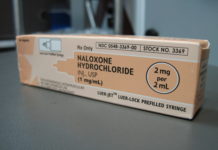work with medical schools in establishing a set of core competencies related to opioid prescriptions and create continuing education programs for physicians and other health care professionals. The state has also written specialty- and location-specific prescribing guidelines, which have been submitted to respective medical boards for review, acceptance and affirmation.
Technology can also play a role in opioid stewardship. Prescription Drug Monitoring Programs (PDMP) allow medication dispensers such as pharmacists to input information about a patient into a statewide database, which physicians can be required to access before writing a prescription. The benefit of a PDMP is the access to information about a patient’s history with a controlled substance that a physician may not have previously had. The information available through a PDMP would give a physician a more complete profile of a patient, which can be taken into consideration before writing a prescription.
According to the CDC, PDMPs are among the most “promising state-level interventions” to improve overprescription rates of opioids.
“Opioids are essential medications in our medical toolbox, but we have to use them more carefully and more judiciously,” Levine said. “And we need to make sure that we moderate the prescriptions, the length of the prescriptions and the doses.”
















